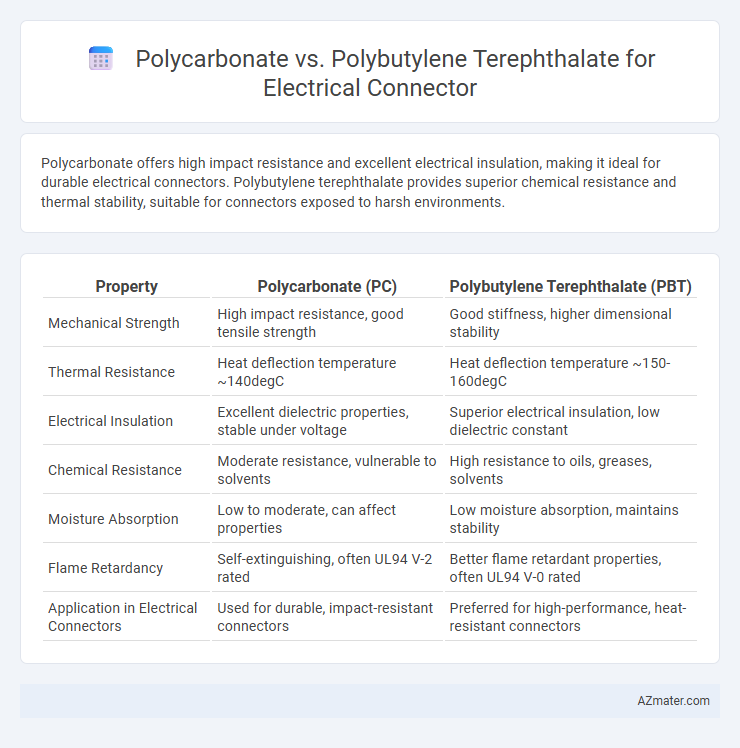Polycarbonate offers high impact resistance and excellent electrical insulation, making it ideal for durable electrical connectors. Polybutylene terephthalate provides superior chemical resistance and thermal stability, suitable for connectors exposed to harsh environments.
Table of Comparison
| Property | Polycarbonate (PC) | Polybutylene Terephthalate (PBT) |
|---|---|---|
| Mechanical Strength | High impact resistance, good tensile strength | Good stiffness, higher dimensional stability |
| Thermal Resistance | Heat deflection temperature ~140degC | Heat deflection temperature ~150-160degC |
| Electrical Insulation | Excellent dielectric properties, stable under voltage | Superior electrical insulation, low dielectric constant |
| Chemical Resistance | Moderate resistance, vulnerable to solvents | High resistance to oils, greases, solvents |
| Moisture Absorption | Low to moderate, can affect properties | Low moisture absorption, maintains stability |
| Flame Retardancy | Self-extinguishing, often UL94 V-2 rated | Better flame retardant properties, often UL94 V-0 rated |
| Application in Electrical Connectors | Used for durable, impact-resistant connectors | Preferred for high-performance, heat-resistant connectors |
Introduction to Polycarbonate and Polybutylene Terephthalate
Polycarbonate (PC) is a durable, impact-resistant thermoplastic widely used in electrical connectors for its excellent electrical insulation and heat resistance up to 115degC. Polybutylene terephthalate (PBT) is a semi-crystalline polyester with superior dimensional stability, chemical resistance, and thermal performance, typically rated for continuous use around 120-150degC. Both materials offer unique advantages in electrical connector applications, with PC excelling in toughness and clarity, while PBT provides enhanced mechanical strength and resistance to environmental stress.
Material Properties: Polycarbonate vs Polybutylene Terephthalate
Polycarbonate offers superior impact resistance and dimensional stability, making it ideal for electrical connectors requiring high toughness and transparency. Polybutylene terephthalate (PBT) features excellent chemical resistance, low moisture absorption, and high electrical insulation properties, which are crucial for reliable connector performance in harsh environments. Both materials provide good thermal resistance, but PBT typically withstands higher continuous operating temperatures compared to polycarbonate.
Mechanical Strength Comparison
Polybutylene terephthalate (PBT) exhibits superior mechanical strength compared to polycarbonate (PC) in electrical connector applications, offering higher tensile strength and better impact resistance. PBT's enhanced dimensional stability under thermal stress makes it more suitable for connectors exposed to fluctuating temperatures and mechanical loads. While PC provides good toughness and flexibility, PBT's robust mechanical properties ensure greater durability and performance in demanding electrical environments.
Thermal Performance in Electrical Connectors
Polycarbonate exhibits excellent thermal stability with a continuous use temperature typically around 115degC, making it suitable for moderate thermal environments in electrical connectors. Polybutylene terephthalate (PBT) offers superior thermal performance, with a higher melting point near 223degC and better heat resistance, allowing connectors to withstand elevated operating temperatures and thermal cycling. PBT's enhanced dimensional stability under heat improves reliability in electrical connector applications exposed to harsh thermal conditions.
Electrical Insulation Capabilities
Polycarbonate offers excellent electrical insulation properties with a high dielectric strength typically around 16-20 kV/mm, making it suitable for connectors exposed to moderate stresses. Polybutylene terephthalate (PBT) provides superior electrical insulation, featuring a dielectric constant of approximately 3.0-3.3 and a high volume resistivity in the range of 10^15 ohm-cm, which ensures minimal electrical leakage in high-performance connectors. PBT's enhanced resistance to moisture and thermal stability further improve its reliability as an insulator in demanding electrical connector applications.
Flame Retardancy and Safety Standards
Polycarbonate (PC) offers excellent flame retardancy with a high UL 94 V-0 rating, making it suitable for electrical connectors requiring stringent safety standards. Polybutylene terephthalate (PBT) also achieves UL 94 V-0 classification but typically exhibits better chemical resistance and dimensional stability under thermal stress. Both materials meet IEC 60695 standards for flame testing, with PC favored for impact toughness and transparency, while PBT is preferred for enhanced electrical insulation and long-term heat resistance.
Chemical Resistance and Environmental Stability
Polycarbonate offers moderate chemical resistance but can degrade when exposed to strong acids and alkalis, limiting its use in harsh chemical environments for electrical connectors. Polybutylene terephthalate (PBT) exhibits superior chemical resistance, particularly against oils, solvents, and fuels, enhancing its durability in demanding industrial applications. PBT also provides better environmental stability, including higher resistance to heat, moisture, and UV exposure, making it more reliable for electrical connectors in outdoor or high-stress conditions.
Cost Analysis and Market Availability
Polycarbonate offers a cost-effective solution for electrical connectors due to its lower raw material price and widespread production, making it readily available in global markets. Polybutylene terephthalate (PBT), while more expensive, provides superior electrical insulation and chemical resistance, appealing to high-performance applications that justify its premium cost. Market availability of Polycarbonate is higher with numerous suppliers and faster lead times, whereas PBT supply chains are more specialized, impacting cost and procurement timelines.
Application Suitability in Electrical Connectors
Polycarbonate provides excellent impact resistance, high dielectric strength, and good dimensional stability, making it suitable for electrical connectors requiring durability and insulation in consumer electronics and automotive applications. Polybutylene terephthalate (PBT) offers superior chemical resistance, low moisture absorption, and enhanced thermal stability, ideal for connectors exposed to harsh environments and continuous electrical load. For high-performance electrical connectors, selecting between polycarbonate and PBT depends on specific application needs such as thermal endurance, mechanical stress, and environmental exposure.
Conclusion: Choosing the Right Material
Polycarbonate offers excellent impact resistance, high transparency, and good electrical insulation, making it ideal for connectors requiring visibility and durability. Polybutylene terephthalate (PBT) provides superior chemical resistance, dimensional stability, and flame retardancy, preferred in harsh environments and high-temperature applications. Selecting the right material depends on the specific electrical connector's operational conditions, with polycarbonate favoring mechanical toughness and aesthetics, while PBT excels in thermal performance and chemical resilience.

Infographic: Polycarbonate vs Polybutylene terephthalate for Electrical connector
 azmater.com
azmater.com